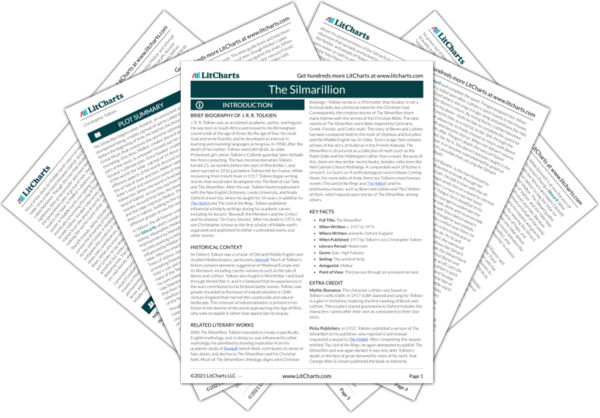Maedhros Quotes in The Silmarillion
Then Fingon the valiant, son of Fingolfin, resolved to heal the feud that divided the Noldor […] Long before, in the bliss of Valinor, before Melkor was unchained, or lies came between them, Fingon had been close in friendship with Maedhros; and though he knew not yet that Maedhros had not forgotten him at the burning of the ships, the thought of their ancient friendship stung his heart. Therefore he dared a deed which is justly renowned among the feats of the princes of the Noldor: alone, and without the counsel of any, he set forth in search of Maedhros; and aided by the very darkness that Morgoth had made he came unseen into the fastness of his foes.

Unlock explanations and citation info for this and every other The Silmarillion quote.
Plus so much more...
Get LitCharts A+Thus was the treachery of Uldor redressed; and of all the deeds of war that the fathers of Men wrought in behalf of the Eldar, the last stand of the Men of Dor-lómin is most renowned.
[…]
Last of all Húrin stood alone. Then he cast aside his shield, and wielded an axe two-handed; and it is sung that the axe smoked in the black blood of the troll-guard of Gothmog until it withered, and each time that he slew Húrin cried: ‘Aurë entuluva! Day shall come again!’
‘If it be truly the Silmaril which we saw cast into the sea that rises again by the power of the Valar, then let us be glad; for its glory is seen now by many, and is yet secure from all evil.’ Then the Elves looked up, and despaired no longer; but Morgoth was filled with doubt.
But the jewel burned the hand of Maedhros in pain unbearable; and he perceived that it was as Eönwë had said, and that his right thereto had become void, and that the oath was vain. And being in anguish and despair he cast himself into a gaping chasm filled with fire, and so ended; and the Silmaril that he bore was taken into the bosom of the Earth.

Maedhros Quotes in The Silmarillion
Then Fingon the valiant, son of Fingolfin, resolved to heal the feud that divided the Noldor […] Long before, in the bliss of Valinor, before Melkor was unchained, or lies came between them, Fingon had been close in friendship with Maedhros; and though he knew not yet that Maedhros had not forgotten him at the burning of the ships, the thought of their ancient friendship stung his heart. Therefore he dared a deed which is justly renowned among the feats of the princes of the Noldor: alone, and without the counsel of any, he set forth in search of Maedhros; and aided by the very darkness that Morgoth had made he came unseen into the fastness of his foes.

Unlock explanations and citation info for this and every other The Silmarillion quote.
Plus so much more...
Get LitCharts A+Thus was the treachery of Uldor redressed; and of all the deeds of war that the fathers of Men wrought in behalf of the Eldar, the last stand of the Men of Dor-lómin is most renowned.
[…]
Last of all Húrin stood alone. Then he cast aside his shield, and wielded an axe two-handed; and it is sung that the axe smoked in the black blood of the troll-guard of Gothmog until it withered, and each time that he slew Húrin cried: ‘Aurë entuluva! Day shall come again!’
‘If it be truly the Silmaril which we saw cast into the sea that rises again by the power of the Valar, then let us be glad; for its glory is seen now by many, and is yet secure from all evil.’ Then the Elves looked up, and despaired no longer; but Morgoth was filled with doubt.
But the jewel burned the hand of Maedhros in pain unbearable; and he perceived that it was as Eönwë had said, and that his right thereto had become void, and that the oath was vain. And being in anguish and despair he cast himself into a gaping chasm filled with fire, and so ended; and the Silmaril that he bore was taken into the bosom of the Earth.











